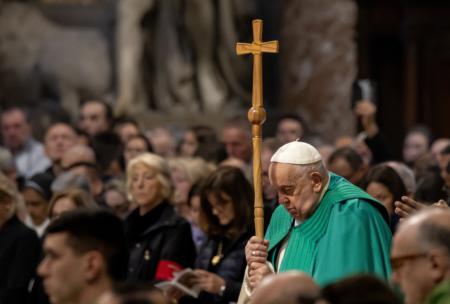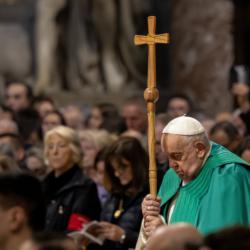Suicide and the Catholic Church
Q. A friend's sibling committed suicide about 20 years ago while in high school -- after struggling with depression for years, despite getting treatment, counseling and a lot of family support. The family was -- and still is -- devastated. At the time, the family's priest said something about suicide being a sin, which added to the family's hurt and turned them away from the Church.
I fully support respect for life, but I think I remember reading that the Church has changed its thinking about depression-related suicide in recent years and now relates it to an illness that might not be a sin in those circumstances. Is that correct, and do you have any suggestions for helping the family think about getting back to Church?
(I don't want to add to the family's pain or be seen as meddling, so please withhold my name and city. I have been praying and just want to help if possible.) (City and state withheld)
A. I commend you for your concern -- and for your prayers for that family. The hurt from a suicide lasts a long time, and I will pray for them, too. Your question arrived in my email during the same week that I was involved in a funeral for a suicide victim.
I have explained to this family that, when I was first ordained (in the 1960s), the common practice of the Church was not to celebrate a funeral Mass for someone who had chosen to take his own life.
But that is no longer true; the Church has grown wiser since then and now understands that grave psychological anxiety can sometimes mitigate -- or even remove -- a person's capacity to make decisions and his moral responsibility for those choices.
Based on that, the Catechism of the Catholic Church now says, "We should not despair of the eternal salvation of persons who have taken their own lives" (No. 2283). This family, I believe, has found some comfort in knowing that.
Q. I was recently asked whether an infant can be baptized into the Catholic Church even if his parents, although Catholic (non-practicing), were married in a civil ceremony. The parents were told by a priest that they had to be married in the Church before the infant could be baptized. I don't think this is correct. What does Church law say? (Kansas)
A. There is nothing in Church law that requires that parents be married in a church ceremony prior to having their child baptized -- although that, of course, would be the ideal.
In 2014, the Italian press reported that Pope Francis had baptized the child of an unmarried couple in a ceremony in the Sistine Chapel; and in 2009, while still a cardinal in Argentina, the pope was quoted as telling the Italian magazine "30 Giorni" that "the child has absolutely no responsibility for the state of the parents' marriage."
Canon law does say, though, that for a baptism to take place, "there must be a founded hope that the infant will be brought up in the Catholic religion" (Canon 868). That same canon goes on to note that "if such hope is altogether lacking, the baptism is to be delayed ... after the parents have been advised about the reason." (The baptismal ceremony itself includes a pledge by the parents to raise and educate the child in the beliefs and practices of the Catholic faith.)
What I normally do is to meet for half an hour individually with each couple who are having their first child baptized. If I have not seen them regularly in church, I am particularly direct in highlighting their own responsibility to support the child's growth in faith by their own Catholic practice. (Only a couple of times -- in more than 50 years -- have I sensed that this commitment was "altogether lacking.")
- Father Kenneth Doyle is a columnist for Catholic News Service



















